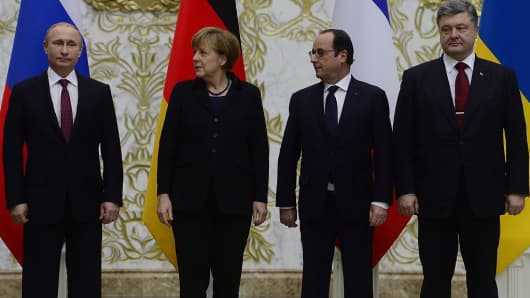The European Union is likely to change its approach to handling Russia when its heads of state meet next month, analysts say, as support for economic sanctions wanes among its members and there is recognition that the peace process between Russia and Ukraine is not delivering.
Mujtaba Rahman, Cliff Kupchan and Alex Bridau from risk consultancy Eurasia Group said in a note Monday that next month’s meeting of the European Council would “signal the beginning of the end of (the) Minsk process” – a fragile ceasefire between Russia and Ukraine brokered by France and Germany’s leaders in 2014 and 2015 in a bid to stop an escalation of border violence between pro-Russian rebels and Ukrainian forces.
The ceasefire looks vulnerable with both sides accusing one another of not complying with their side of the bargain – such as a complete cessation of hostilities and local elections in separatist regions – which has led to a tense political stalemate.
The EU responded to the skirmishes and Russia’s apparent military support for pro-Russian separatists in Ukraine – not to mention Russia’s annexation of Crimea — by placing sanctions on the country but these are up for renewal in January 2017 and are likely to be a source of contention too at the Council’s meeting next month, analysts believed.
Sanctions regarding the crisis in Ukraine include restrictive measures and asset freezes on entities and individuals deemed by the EU to bear “responsibility for actions which undermine or threaten the territorial integrity, sovereignty and independence of Ukraine” were extended last week until March 2017.
However, sanctions regarding the “illegal annexation” of Crimea are of a more economic (and, arguably, more damaging) nature. They include an import ban on goods from that region and restrictions on trade and investment. They are due to expire on 31 January 2017 at which point the EU will announce whether it will extend or revoke them.
“EU sanctions easing against Russia in January 2017 is looking less likely, given Russia’s lack of compliance against the Minsk benchmarks,” Rahman, Kupchan and Bridau said.
“However, Berlin and Paris recognize Minsk is not delivering; as such, October’s European Council is likely to kick-start a debate on moving towards a more “step-by-step” approach, paving the way for sanctions easing after January,” the analysts added.
Lack of progress
Overshadowing the flaws in the Minsk agreement is Europe’s own divisions over what to do about sanctions and how to approach its blossoming relationship with Ukraine, a former Soviet country to which it wants — much to the displeasure of Russia – to forge closer links.
While countries in southern Europe, like Greece and Italy, favor relaxing sanctions, others are keen to continue the tough stance against Russia. Eurasia Group noted that, despite the divergence of opinion, the lack of concrete progress over the peace agreement couldn’t be ignored.
“The parties to Minsk are making very little progress against the peace plan’s benchmarks. Fighting has currently subsided, but as in the past will likely again pick up,”
Summing up the key stumbling blocks, Eurasia Group’s analysts said that “the Russian side insists that any agreement must protect the rights of ethnic Russians and Russian speakers, either through a constitutional amendment giving the separatist regions wide autonomy or international guarantees…while the Ukrainians, on the other hand, insist that the return of border control in separatist-held areas and the withdrawal of Russian troops and weapons must precede a deal on decentralization and special status.”
Changing tack?
The analysts noted that there was an increasing realization in Europe that the current Minsk framework was “not delivering” results and that it might have to change strategy.
“Under the approach of “nothing is agreed until everything is agreed,” and full implementation of and compliance with Minsk means Ukraine has re-secured its border, it makes it very hard to reward Moscow for any incremental progress it may make,” Rahman and his colleagues at Eurasia Group said.
“Berlin and Paris are thus warming to the view that the Minsk framework may have to change. This would involve moving towards a more “step-by-step” approach which would create tangible incentives to make meaningful, if incremental, progress” they said, noting that this could see the EU connecting the dismantling of particular economic sector sanctions to partial progress in the peace process.
The U.S. has also placed Russia under sanctions but Eurasia Group said that a softer stance towards Russia from the Europeans was unlikely to be seen from the U.S.
“For the U.S. to consider easing sanctions, either an Obama or a Clinton Administration would need high confidence that Russia actually wants to solve the Ukraine conflict, and that’s not on the horizon. US-Russian relations are dogged by not only Ukraine, but a touch-and-go deal on Syria, cyber issues, an abiding distrust of Putin, and Moscow’s human rights record. The U.S. has far fewer economic interests in Russia, and is less motivated by constituencies to ease sanctions.”
“All in, given the political context of US-Russian relations, and likely future U.S. policy toward Ukraine, there’s a real potential for EU-US divergence on Ukraine sanctions next year,” they warned.
Written by Holly Ellyatt


